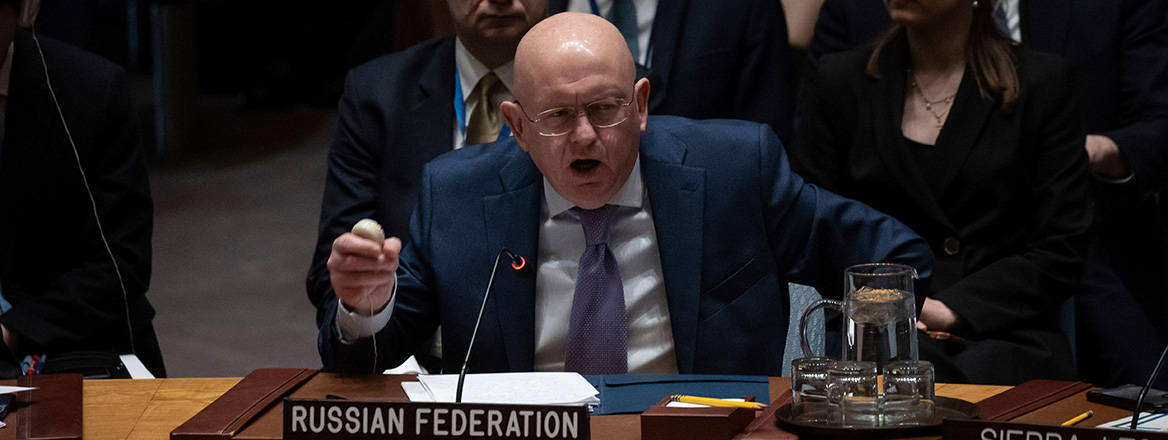Russia Just Gutted the UN Panel of Experts on North Korea – What Now?
Russia has long ignored its obligation to implement international sanctions against North Korea – and now it may finally have dealt them a fatal blow.
In what amounts to a significant turning point in the international sanctions regime against North Korea, Russia recently vetoed a UN Security Council resolution to extend the North Korea UN Panel of Experts’ mandate for another year – breaking 14 years of unanimous support. Russia’s UN Ambassador, Vasily Nebenzya, lambasted the UN sanctions against North Korea as ineffective, before launching an attack on the UN Panel of Experts’ work, claiming its investigations were biased products of Western influence.
In a joint statement following the vote, the US, France, Japan, South Korea and the UK criticised Russia’s action as ‘nothing more than an attempt to silence independent, objective investigations’ – specifically those concerned with Russia’s acquisition of conventional weapons from North Korea – and an affront to upholding global non-proliferation norms.
Unfortunately, Russia’s actions have far more dire consequences than merely bringing an end to a UN body responsible for monitoring compliance with one of the world’s largest and most complex sanctions regimes. Not only will countries lose access to authoritative sources of information, but it is likely that the sanctions against North Korea will now persist in a zombie-like state – neither updated nor monitored.
14 Years of Authoritative Reporting
First established in 2009 with the adoption of Resolution 1874, the Panel of Experts for North Korea is tasked with gathering, analysing and reporting on incidents of non-compliance with the UN sanctions against North Korea. The Panel itself is made up of eight independent experts, each appointed by the UN Secretary General to serve terms of at least one year but no more than five. I personally served as the finance expert on the Panel from 2019 to 2021.
During each mandate period, which lasts one year, the Panel produces two key documents – the midterm and final reports, which detail North Korea’s sanctions evasion activities, highlight emerging trends, and document the country’s progress on its ballistic missile and nuclear weapons programmes.
Up until 2017, when the Security Council made its last designation, the reports and accompanying recommendations played a critical role in identifying new targets for the Security Council to designate. Importantly, the reports are consensus-based, meaning that – while Russia argues that they are biased – the reports are in fact agreed upon by all members of the Panel, including those from Russia and China.
What is clear is that Russia would rather burn down institutions that support international peace and security than work in good faith
While the reports were never meant to assess the efficacy of the sanctions regime, they do have a hand when it comes to implementation. Countries’ national authorities and their private sector institutions have relied on cases outlined in the reports over the years to inform their own domestic rules and regulations related to implementation. Also, the cases presented in the reports have provided clarity on sometimes complex and vague obligations, together with practical information for countries to pursue legal and criminal enforcement. This was especially true for countries that lacked significant resources to put behind sanctions implementation – an often costly endeavour.
Furthermore, in the absence of a direct enforcement mechanism, the reports have acted as something of an incentive for countries to follow UN sanctions through naming and shaming. It was often in a country's interest to avoid being named in a report.
Why Did Russia Sink the Panel?
Russia’s veto on extending the Panel’s mandate is just another episode in a long history of chipping away at the Panel’s autonomy and its ability to follow through on its mandate. Working with China, for example, Russia was able to leverage its influence to hamstring the Panel’s ability to effectively conduct investigations, slashing budgets and imposing pointless administrative travel restrictions.
While China attracts a lot of criticism for its blatant attempts to control any content in the reports that it perceives to be a threat to its sovereignty or territorial integrity, Russia is guilty, too. Should it really come as a surprise that Russia is effectively ending the Panel that is charged with investigating and making public its acquisition of ballistic missiles and conventional weapons from North Korea – a blatant and egregious violation of its international obligations?
Russia’s interference also extends beyond just the North Korea Panel of Experts. Seeking to hide its mercenary activities in Africa, Russia deliberately held up the appointment of experts to the South Sudan, Democratic Republic of Congo, Central African Republic and Mali expert panels in 2021.
What is clear is that Russia would rather burn down institutions that support international peace and security than work in good faith.
A Grim Future
An 11th-hour fix is possible, but unlikely. Russia and China have, in the past, threatened not to renew the mandate unless the 1718 Committee agreed to changes to the Panel’s mandate. Most of these were relatively insignificant, but cumulatively chipped away at the Panel’s autonomy. Nonetheless, a second bite of the apple may be too bitter for the US, the UK and France to accept.
Without an effective monitoring mechanism, countries may have little incentive to implement sanctions as robustly
The UN sanctions regime against North Korea is in trouble, too. The Security Council has been ineffective at making even modest changes, like new designations, since 2017. It seems unlikely now that the permanent members of the Security Council will find any sort of political agreement, leaving sanctions implementation in a state of limbo. Furthermore, without an effective monitoring mechanism, countries may have little incentive to implement sanctions as robustly.
What’s left is ultimately a sanctions regime with no enforcement or monitoring mechanism, and enough political disagreement to ensure stagnation for the foreseeable future.
Of course, Western governments and civil society will step in to provide intelligence on North Korea’s activities and shore-up unilateral sanctions. Just this month, for example, RUSI’s Open Source Intelligence and Analysis team released a report showing North Korean tankers loading oil in Russian ports – another blatant violation of international sanctions. Yet, despite the clear evidence presented in this report and reports like it, many countries will still view them with suspicion, seeing them as instruments of Western intelligence propaganda. They will not enjoy the near universal trust that Panel reports have been able to garner.
This, unfortunately, is what makes Russia’s veto so devastating – not only does it fundamentally reject and undermine non-proliferation norms, but it also exacerbates distrust. There can be little doubt that North Korea will once again prove itself capable of exploiting that distrust to advance its ballistic missile and nuclear weapons programmes.
The views expressed in this Commentary are the author’s, and do not represent those of RUSI or any other institution.
Have an idea for a Commentary you’d like to write for us? Send a short pitch to commentaries@rusi.org and we’ll get back to you if it fits into our research interests. Full guidelines for contributors can be found here.
WRITTEN BY
Dr Aaron Arnold
RUSI Senior Associate Fellow, CFS
Centre for Finance and Security
- Jim McLeanMedia Relations Manager+44 (0)7917 373 069JimMc@rusi.org


